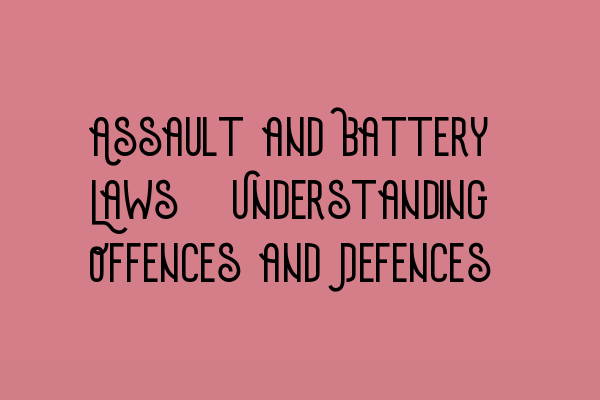Assault and Battery Laws: Understanding Offences and Defences
As experienced criminal law solicitors at SQE Criminal Law & Practice Law UK, we understand the importance of knowing the ins and outs of assault and battery laws. In this comprehensive guide, we will dive into the definition of assault and battery, the various types of offences, and the possible defences one can employ.
Definition of Assault and Battery
Assault and battery are two distinct but often intertwined offences under criminal law. Assault refers to the intentional act of causing apprehension in another person of immediate physical harm, whereas battery involves the intentional and unlawful application of force to another person.
It is essential to note that assault does not require physical contact, whereas battery necessitates physical contact. Both offences can lead to severe legal consequences and must be treated with utmost seriousness.
Types of Assault and Battery Offences
There are several types of assault and battery offences that individuals can be charged with. These include:
- Common Assault: This is the most basic form of assault and includes causing fear of immediate harm or unwanted physical contact.
- Assault Causing Actual Bodily Harm (ABH): This offence involves intentionally or recklessly causing physical harm that goes beyond transient or trifling injuries.
- Wounding or Grievous Bodily Harm (GBH): This is a more serious offence where the accused causes grievous bodily harm with intent to do so or inflicts wounding.
- Aggravated Assault: This offence typically involves assault with a weapon, assault on certain protected categories of individuals, or assault with the intent to commit another crime.
Possible Defences for Assault and Battery
When faced with assault and battery charges, it is crucial to explore potential defences to protect your rights and achieve the best possible outcome. Some common defences include:
- Self-Defence: If you can demonstrate that you acted to protect yourself or others from immediate harm, self-defence may be a viable defence strategy.
- Consent: Consent can be a defence in certain situations, such as sports or activities where physical contact is expected and agreed upon.
- Mistaken Identity: If you can establish that you were not the person who committed the assault or battery, mistaken identity could be a potential defence.
- Lack of Intent: It is possible to argue that the alleged assault or battery was accidental or unintentional, which can help in building a defence.
Understanding the specific circumstances and evidence surrounding your case is crucial for determining the most appropriate defence strategy. Consulting with an experienced criminal law solicitor can provide you with the guidance you need to navigate the legal complexities.
Get Prepared with SQE Criminal Law & Practice
As a prospective solicitor preparing for the SQE exams, it is important to have a comprehensive understanding of criminal law, including assault and battery offences. SQE 1 Practice Exam Questions and SQE 1 Practice Mocks FLK1 FLK2 are valuable resources to test your knowledge and hone your skills.
To further enhance your preparation in criminal law, consider enrolling in SQE 2 Preparation Courses and SQE 1 Preparation Courses. These courses are designed to equip you with the necessary knowledge and practical skills needed to excel in the SQE exams.
For more information about the SRA SQE Exam Dates and how to best prepare for the exams, we recommend visiting our website. Our team is dedicated to providing the guidance and support you need to succeed.
Remember, understanding assault and battery laws is essential for both legal professionals and individuals seeking to protect their rights. If you require legal assistance or advice regarding assault and battery offences, do not hesitate to reach out to our expert solicitors at SQE Criminal Law & Practice Law UK.
